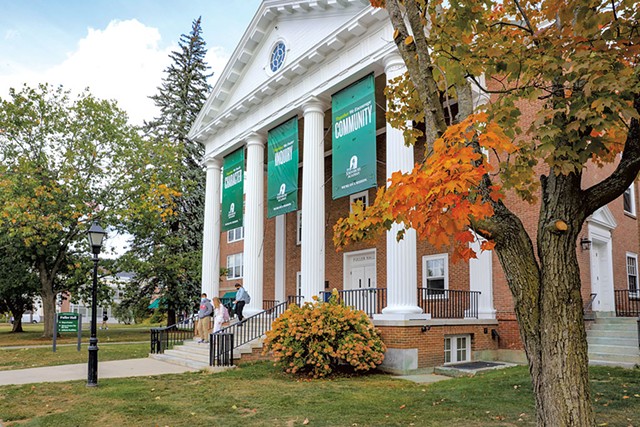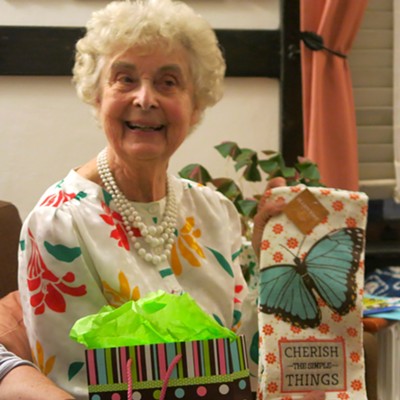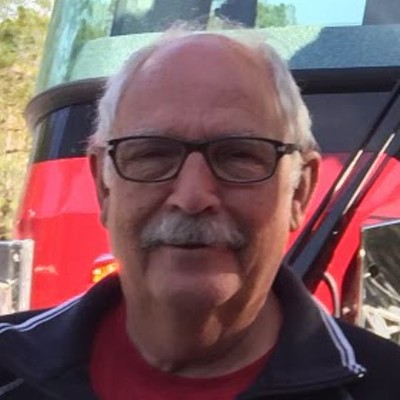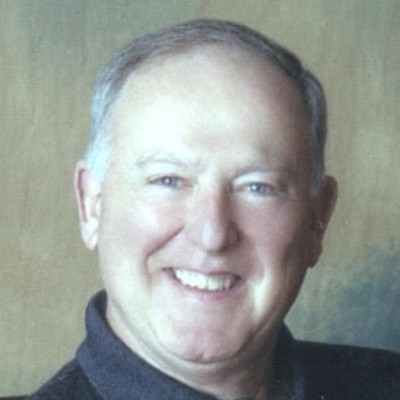
- File: Steve Legge
- Fuller Hall at St. Johnsbury Academy
After more than a year of painstaking deliberations, last week the State Board of Education adopted rules it says will prevent Vermont private schools that receive public dollars from discriminating against students with disabilities.
That means so-called independent schools that accept state funds will not be allowed to deny enrollment to students based on their special-education needs. It's the state's latest attempt to hold all schools that receive taxpayer money to standards similar to those for public schools — a push that some independent schools have bristled at in the past.
The new rules will give all students "a clearer process" for enrolling and diversify the pool of students at independent schools, said State Board of Education member Jennifer Samuelson of Winhall.
"Increased access ... should allow students to enroll in the school that fits their educational interests," she said.
Vermont has a unique "tuitioning" system that allows towns without an elementary, middle or high school to spend tax dollars to send their students to their preferred public or approved private school. For instance, a pupil in the Grand Isle Supervisory Union, which does not have a high school, could choose to attend a public institution in Chittenden or Franklin county — or a private school.
The allotted maximum amount a district pays fluctuates slightly from year to year. This school year, districts pay about $15,500 to an elementary school that takes one of its students and about $17,000 to a middle or high school.
Vermont spent roughly $85 million sending 3,400 students to in-state private schools during the 2018-19 school year, according to a March 2021 report from the State Auditor's Office. About 65 Vermont independent schools participate in the program, accepting students from some 45 school districts. Over the decade ending with the 2018-19 school year, state spending on tuition for in-state independent schools increased by 71 percent, the auditor's report found.
Rachel Seelig, the director of Vermont Legal Aid's Disability Law Project, said that for years she has seen students with disabilities denied admission to — or asked to leave — independent schools because of their special needs.
"The [Disability Law Project] is optimistic that these rule changes will allow students with disabilities who live in school districts that do not operate a school the same opportunities as their non-disabled peers — and often siblings — enjoy," Seelig wrote in an email.
This attempt to rewrite the rules affecting independent school admissions was mandated by the passage in 2018 of a law, Act 173, that also changed how the state pays for special education. The 36 pages of new rules deal with everything from how to conduct investigations of independent schools when complaints are made to how therapeutic schools — independent schools that serve only students with specific special needs — set their tuition rates.
Arguably the most consequential section requires independent schools to publish and follow a written enrollment policy that explains any "special considerations or requirements" for acceptance, "none of which shall disadvantage a student based on the student's membership in a protected class, the student's actual or suspected disability, or the student's socioeconomic status." The policy must also explain how the school makes admissions decisions when there are multiple applicants vying for a limited number of spots.
A policy that requires applicants to submit test scores might violate the rules. But the changes don't amount to an open first-come, first-served enrollment process, state board member Samuelson explained. She chaired a subcommittee that revamped the proposed rules and addressed concerns raised by the public.
For example, an independent school still could have a policy that gives enrollment preference to siblings of an already-enrolled student, or a private ski academy could specify that skiing ability is a factor that will be considered in admissions, as long as the school explicitly states the criteria.
"The tension here is between requiring nondiscriminatory enrollment practice on the one hand and ... otherwise preserving the autonomy of independent schools," Samuelson said. That balance sometimes feels like "dancing on the head of a pin," she added.
About 31 of Vermont's private schools do not offer special-education services, according to Mill Moore, the executive director of the Vermont Independent Schools Association. All will be compelled to do so if they want taxpayer funds — but the adoption will likely depend on a number of factors. If a school typically enrolls only a few tuitioned students, for instance, it may decide to forgo the public money rather than comply.
St. Johnsbury Academy, where 72 percent of students attend through Vermont's tuitioning program, already provides an array of services for students with special needs, including a math specialist, two literacy specialists and additional teachers trained in methods to help struggling readers, according to Mathew Forest, the school's director of special services. Forest, who helped shape the new rules, doesn't expect them to require changes at his school.
"Many students who qualify for special education are very intelligent, with a learning challenge in a specific area, and many of these challenges can be overcome when students are provided with the appropriate academic support and instruction," Forest said in an email. "We embrace the opportunity to serve these students."
It's unclear, though, what independent schools will do if the new rules prompt more special-education students — or those with more severe disabilities — to enroll. In 2017, a surge in applications from students with disabilities prompted the Lyndon Institute to say it might need to limit the number of such students it would accept. The new rules are designed to prevent such policies. Lyndon's head of school could not be reached for comment.
There is one loophole: The rules don't apply to schools outside Vermont. In fiscal year 2021, the state paid nearly $1.5 million to about 50 out-of-state independent schools — including upscale boarding schools Phillips Exeter Academy, Choate Rosemary Hall and Emma Willard School — through its school choice program. Those schools are governed by another statute that says public tuition can go to private schools in another state or country as long as the school is approved under the laws of that state or country.
Related With Schools in Crisis Mode, Kids With Disabilities Are Being Left Behind

At a meeting last week, State Board of Education member Kim Gleason of Grand Isle raised concerns about this disparity, which remains unresolved. Students with disabilities who live in border towns may not have the same slate of out-of-state independent schools to choose from as their nondisabled peers, Gleason noted.
"I think that was exactly what [Act] 173 was intending to prevent," Gleason said. "To leave that risk of violating a student's civil rights that lives at the border ... I feel like we have a responsibility to point out that inconsistency."
Samuelson, a lawyer, likened the state board's rulemaking process to "a negotiation" in which "no one gets everything that they want, no one leaves completely satisfied, but everyone gets what they need."
The effort to update the rules for independent schools is not a new one. In 2016, the State Board of Education pushed for a broad range of changes, including making the admissions process more equitable. Independent schools and community members pushed back, arguing that the proposal was too sweeping.
"These rules would destroy smaller independent schools, and would seek to force [us] to become, for all intents and purposes, a public school," Mark Tashjian, headmaster of Burr and Burton Academy in Manchester, wrote in an October 2016 letter to his school community. "This is something we will not allow to happen."
Ultimately, state lawmakers stopped the rulemaking attempt and created a legislative committee to study the issue.
Oliver Olsen of Londonderry — now chair of the State Board of Education but then an independent state legislator and a trustee of Burr and Burton Academy — was a vocal opponent of the proposed rule changes in 2016.
In an interview last week, Olsen said he objected to the earlier process because he felt that the Agency of Education developed the proposed rules behind closed doors and that the state board tried to rush them through without input from the affected schools and community members. He contrasted that approach to the current one, which he said was "inclusive and collaborative."
But Sean-Marie Oller of Bennington, a state board member in 2016, remembers it differently. The board held four public hearings on the rules, she said, but then-governor Peter Shumlin torpedoed the process under pressure from independent school lobbyists. Stephan Morse, the state board chair at the time, made similar claims in a November 2016 VTDigger.org article.
Oller also said she doesn't believe that the newly written state rules go far enough in ensuring "open and equitable admission" at independent schools that take state dollars. For example, a private school still could reject a student who had poor grades or discipline problems, she said in an email.
The process of crafting the rules this time around was far less dramatic, likely because the board proposed fewer sweeping changes. If the Legislative Committee on Administrative Rules gave them final approval this month, most would take effect on July 1, 2023.
Samuelson said the Agency of Education will begin working soon with independent schools to help them comply with the new policy.
"We tried really hard to be as fair and balanced as we could in crafting the rules," Samuelson said. "It will be interesting to see ... how independent schools throughout Vermont adopt them or what they do with them."








Comments
Comments are closed.
From 2014-2020, Seven Days allowed readers to comment on all stories posted on our website. While we've appreciated the suggestions and insights, right now Seven Days is prioritizing our core mission — producing high-quality, responsible local journalism — over moderating online debates between readers.
To criticize, correct or praise our reporting, please send us a letter to the editor or send us a tip. We’ll check it out and report the results.
Online comments may return when we have better tech tools for managing them. Thanks for reading.